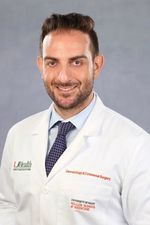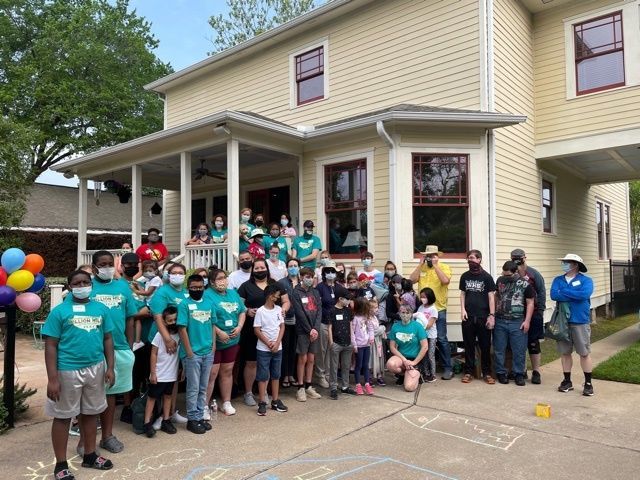
Dr. Naiem T. Issa
The Sturge-Weber Foundation Awards Dr. Naiem T. Issa with the 2020 Lisa’s Research Grant
The Sturge-Weber Foundation is honored to announce its 2020 Lisa’s Research Grant Award recipient, Naiem T. Issa, MD, Ph.D.
Dr. Issa is a clinical dermatologist with graduate training in cancer drug discovery at Leonard M. Miller School of Medicine, in the Dr. Phillip Frost Department of Dermatology and Cutaneous Surgery.
His expertise is in silico drug discovery where computational tools are used to predict molecules that could interact with and modulate disease targets. Specifically, Dr. Issa searches for drugs that are either already FDA approved, experimental, or have been removed from the market due to safety concerns - a process termed drug repurposing.
Dr. Issa will receive $30,000 from the Sturge-Weber Foundation’s Lisa’s Research Grant Program for his research focus on discovering what could be the first small molecule drugs that inhibit (GNAQ) Gq. If successful, such drugs would mark a significant foundational step in drug development for Sturge-Weber syndrome. The discovery of GNAQ (Gq) mutations was a significant milestone in understanding this disease and uncovering a novel therapeutic target. When left unchecked, Gq leads to dysregulated cellular responses such as capillary malformations. Recent research into therapies has focused on targeting the different aspects of Gq signaling. However, no drugs have ever been discovered that directly inhibit the Gq protein itself and ultimately affect all downstream pathways.

Dr. Jack L. Arbiser
The Sturge-Weber Foundation Awards Dr. Jack L. Arbiser with the 2020 SWF Research Grant
The Sturge-Weber Foundation is honored to announce one of its 2020 SWF Research Grant recipient, Jack L. Arbiser, Ph.D., MD.
Dr. Arbiser is board certified in dermatology. He started practicing at Emory Healthcare in 1998. His clinical specialties include lichen planus, melanoma, and skin cancer.
Dr. Arbiser is a member of the Discovery and Developmental Therapeutics research program at Winship Cancer Institute of Emory University. He also holds memberships in the American Academy of Dermatology and the Society of Investigative Dermatology. Dr. Arbiser joined the Dermatology Department at Emory after completing his Ph.D. and medical school training, internship, and residency at Harvard, and then a three-year Howard Hughes Fellowship at Children’s Hospital of Boston in Boston, Massachusetts.
A $10,000 grant award is provided to the Arbiser lab to continue testing potential drug therapies. The lab has introduced the mutant GNAQ gene into endothelial cells. When injected into mice, these cells form vascular tumors like what is seen in SWS patients. This model allows researchers to test potential drugs for SWS in mice. When cells contain certain mutations, they can become more sensitive to different types of stress compared with normal cells. The Arbiser lab has found small molecules based upon the structure of honokiol, a natural product from the Magnolia tree, that induces stress in cells with mutant oncogenes. Dr. Arbiser and his team plan to determine whether these small molecules will selectively stop the growth of SWS-like lesions in mice.
2019 SWF Grant Program Recipients
The Sturge-Weber Foundation was able to provide much-needed funding to two researchers through the generous donation of an anonymous donor. The Lisa’s Catalyst Grant is an annual fellowship grant that is awarded to researchers who have projects that specifically further the medical research being done for Sturge-Weber syndrome and other Port-Wine birthmark conditions.
Sebastien Gauvrit, Ph.D., received $25,000 for his project “Investigating Sturge-Weber syndrome vascular defects using zebrafish”. Dr. Gauvrit is at the Max Planck Institute for Heart and Lung Research/Department of Developmental Genetics. This project will: generate novel genetic tools in zebrafish to model SWS.
Lisa Arkin, MD, of the University of Wisconsin School of Medicine & Public Health/Department of Dermatology, received $19,245 for her research project. The purpose of her research is to use molecular analysis with clinical and imaging assessments such as optical coherence thermography (OCT).
The Sturge-Weber Foundation was able to provide much-needed funding to several researchers through the generous donation of an anonymous donor as well as all of our supporters. Catalyst Grants were provided to several researchers who specialize in projects related to Sturge-Weber syndrome and other Port-Wine birthmark conditions.
Sarah E. Wetzel-Strong, Ph.D. of Duke University School of Medicine/Department of Human Genetics.. Dr. Wetzel-Strong received $25,000 for her project “Characterizing lesion development in a mouse model of Sturge-Weber syndrome”. This research will test several hypotheses surrounding GNAQ.
Four other researchers and one SWF-specific project were provided funding to continue their research studies. The recipients of these awards are:
Nathan Lawson, Ph.D.: $7,000 - Generation of a zebrafish model for modeling Sturge-Weber syndrome
Naiem Issa, Ph.D.: $5,000 - GNAQ Inhibitor Compound Study
Jonathan Pevsner, Ph.D.: $5,000 - SWS Registry and Research
Sara Sabeti, $5,000 - SWS Consensus Paper
SWF Biorepository Seed Funding, $10,000







